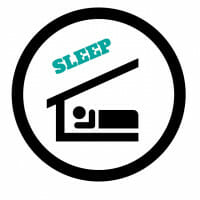
Sleep on It
Here are 15 ways to get a better sleep tonight — or any night!
- Drink tea: Herbal tea can help you relax before bedtime.
- Read a book: Meander your way through a favorite book to help power down from a hectic day.
- Put away the tablet: The blue light from tech devices tricks your mind into thinking it’s day, so turn off gadgets 30 minutes before you need to go to sleep.
- Have a snack: Honey, nuts and dairy all contain compounds that may induce sleep.
- Stretch it out: Stretching relieves aches, but it can also calm you and prep you for sleep.
- Meditate: Clearing your mind allows you to drift off to sleep.
- Hide the light: Electronics, alarm clocks and street lamps can prevent deep sleep. Cover anything that’s contributing to light pollution.
- Take a warm shower: A warm bath or shower can soothe muscles; it’s also great if you’re suffering from a cold or allergies.
- Exercise: Expend your energy for the day with exercise, and you’ll be ready to drift off to sleep as soon as your head hits the pillow.
- Eat an earlier dinner: Going to sleep with a full stomach can make lying down uncomfortable. Go with an earlier, lighter dinner.
- Soothe with smell: Lavender and tea tree oil are soothing scents; add a few drops of these essential oils to your sheets.
- De-stress: Worrying keeps you up; learn to take time out to de-stress, both during the day and before bed to clear your mind.
- Try a natural remedy: Many people swear by the supplements melatonin and valerian for helping you get to sleep naturally.
- Stop your afternoon coffee breaks: Caffeine affects people differently, but if tossing and turning correlates to your afternoon coffee run, now’s the time to stop.
- Have a routine: Taking time to wind down at night can help you prep your body and mind for a good night’s sleep. Pick a few items from this list to make a pre-bedtime routine.
Adapted from “These 20 Tips Will Have You Asleep in No Time.” RSS. 4 Aug. 2015. Web. 4 Sept. 2015.
Optimize Your Nap
- The power nap: A 10- to 20-minute nap is considered the best type of nap to get straight back to work.
- The NASA nap: This 26-minute nap has been proven by scientists to improve alertness by 54 percent. Try it during a long day of classes and homework.
- The bad nap: A 30-minute nap causes “sleep inertia,” also known as a sleep hangover, for up to 30 minutes before the benefits of the nap kick in. It is best to avoid this type of nap if possible.
- The slow-wave sleep nap: A one-hour nap helps cognitive memory processing and remembering places, faces and facts. This type of nap is best before a big presentation.
- The full sleep cycle nap: A 90-minute nap helps creativity, emotional memory and procedural memory. This type of nap is best before an impending project deadline or a big exam.
The ideal time to nap is between 1 and 4 p.m. The best position to nap in is lying down, but slightly upright, as to avoid deep sleep.
Adapted From “Master the Art of Napping.” TotalBeauty. 17 June 2015. Web. 4 Sept. 2015.

